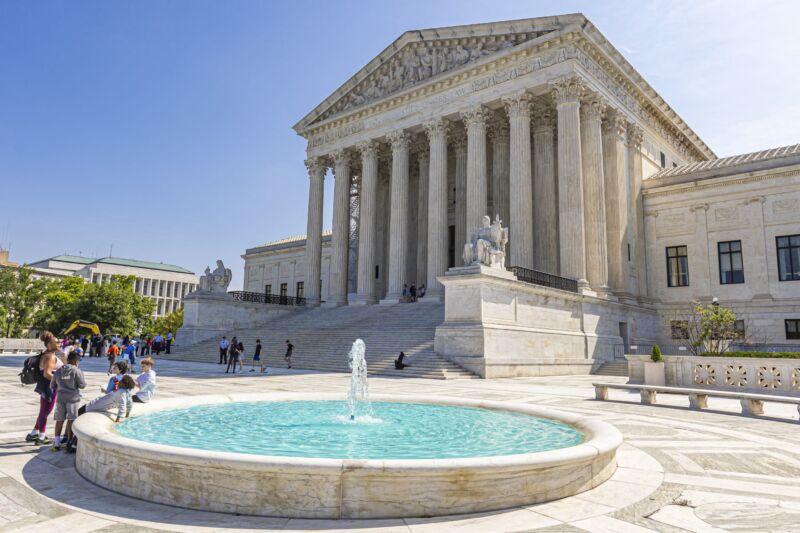
Enlarge / The Supreme Court of the United States in Washington, DC, in May 2023.
Getty Images | NurPhoto
Four more large Internet service providers told the US Supreme Court this week that ISPs shouldn't be forced to aggressively police copyright infringement on broadband networks.
While the ISPs worry about financial liability from lawsuits filed by major record labels and other copyright holders, they also argue that mass terminations of Internet users accused of piracy "would harm innocent people by depriving households, schools, hospitals, and businesses of Internet access." The legal question presented by the case "is exceptionally important to the future of the Internet," they wrote in a brief filed with the Supreme Court on Monday.
The amici curiae brief was filed by Altice USA (operator of the Optimum brand), Frontier Communications, Lumen (aka CenturyLink), and Verizon. The brief supports cable firm Cox Communications' attempt to overturn its loss in a copyright infringement lawsuit brought by Sony. Cox petitioned the Supreme Court to take up the case last month.
Sony and other music copyright holders sued Cox in 2018, claiming it didn't adequately fight piracy on its network and failed to terminate repeat infringers. A US District Court jury in the Eastern District of Virginia ruled in December 2019 that Cox must pay $1 billion in damages to the major record labels.
Cox won a partial victory when the US Court of Appeals for the 4th Circuit vacated the $1 billion verdict, finding that Cox wasn't guilty of vicarious infringement because it did not profit directly from infringement committed by users of its cable broadband network. But the appeals court affirmed the jury's finding of willful contributory infringement and ordered a new damages trial.
Future of Internet at stake, ISPs say
The Altice/Frontier/Lumen/Verizon brief said the 4th Circuit ruling "imperils the future of the Internet" by "expos[ing] Internet service providers to massive liability if they do not carry out mass Internet evictions." Cutting off a subscriber's service would hurt other residents in a home "who did not infringe and may have no connection to the infringer," they wrote.
The automated processes used by copyright holders to find infringement on peer-to-peer networks are "famously flawed," ISPs wrote. Despite that, the appeals court's "view of contributory infringement would force Internet service providers to cut off any subscriber after receiving allegations that some unknown person used the subscriber's connection for copyright infringement," the brief said.
Under the 4th Circuit's theory, "an Internet service provider acts culpably whenever it knowingly fails to stop some bad actor from exploiting its service," the brief said. According to the ISPs, this "would compel Internet service providers to engage in wide-scale terminations to avoid facing crippling damages, like the $1 billion judgment entered against Cox here, the $2.6 billion damages figure touted by these same plaintiffs in a recent suit against Verizon, or the similarly immense figures sought from Frontier and Altice USA."
Potential liability for ISPs is up to $150,000 in statutory damages for each work that is infringed, the brief said. "Enterprising plaintiffs' lawyers could seek to hold Internet service providers liable for every bad act that occurs online," they wrote. This threat of financial liability detracts from the ISPs' attempts "to fulfill Congress's goal of connecting all Americans to the Internet," the ISPs said.